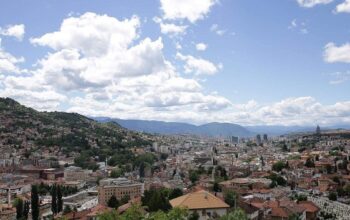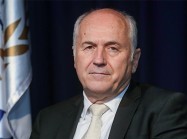In early February, several cities in BiH—specifically, inside the Federation—witnessed large-scale popular protests, which have continued in various forms up until now. Citizens came out into the streets to express their frustration with ineffectual governments and a stifling lack of opportunity. Tuzla was the first city to see major protests, though Sarajevo and other cities were not far behind. Most of the protesters’ ire was directed at their cantonal governments, with the Tuzla demonstrations focusing on the repercussions of “privatization” of local factories, once owned by the canton, which used to employ the majority of Tuzlans. Once in private hands the plants were closed and their employees discharged.
Audiences around the region and the world saw the images of destruction that eventually emerged from the protests, as police and demonstrators clashed and frustrated citizens looted and set fire to canton and BiH government buildings. These images are not different, except for being briefer and more peaceful, than what the world has seen from mass protests in other countries around the world. In past months , Caracas, Athens, Sanʻa, Manama, Tunis, Bangkok, and other cities have seen far worse unrest and destruction and loss of life than Sarajevo and Tuzla.
What has been quite different in the case of the recent BiH protests has been the response of the international community. Almost from their inception, these protests drew explicit expressions of praise and support from the Office of the High Representative and the United States embassy. The EU Delegation to BiH was less enthusiastic, but not by much.
It is the norm, when commenting on protests going on in host countries, for foreign missions of the United States and EU states to express “concern,” and to “urge restraint” on the part of both protesters and governments. But when protests broke out in BiH, the US explicitly took the side of the protesters, and did so well before the formation of the first demonstrators’ “plenum,” through which activists within the protest movement have worked to formalize their grievances. Once the plena were formed, the US, OHR, and EU wasted no time in meeting with their representatives and holding them up as models of participatory democracy.
The problem is, BiH, the Federation, and Republika Srpska already have participatory democracy. Elections in BiH have been repeatedly certified as free and fair by OSCE monitors. Those protesters in the streets are also voters, the very same voters who chose the governments which have been criticized for months by the OHR and US. Obviously, the most effective action the protestors can take is to mobilize for the nationwide elections this October. By denigrating the elected governments in BiH, foreign representatives have undermined the constitutional machinery of democracy that they helped create.
Unpopular governments are not unique to BiH. The domestic approval rating of the United States Congress is consistently under 15%; President Obama’s is well under 50%. The US Congress came within a few votes last year of refusing to fund the national debt. Has the EU opened negotiations with the crowds that routinely gather in front of the White House? When Belgium—home of the EU’s capital—failed for a full year to form a government, did America reach out to the anti-deadlock demonstrators in Parc du Cinquanenaire?
The frustration of Federation citizens is easy to understand. What’s not so clear is why the US government thinks street protests and peoples’ plena (consisting of hundreds of participants at most) are more democratic and legitimate avenues for reform than citizen participation in the nation-wide elections held every two years pursuant to the US-sponsored Dayton constitution.


